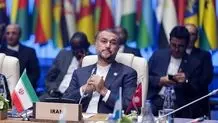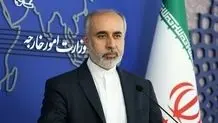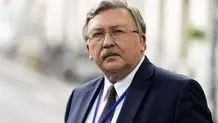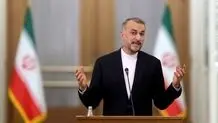Iran-US agreement positively impacts indirect JCPOA talks: FM
Iranian Foreign Minister Hossein Amir-Abdollahian says that the recent agreement between Tehran and Washington will have a positive impact on the indirect sanctions-removal talks.
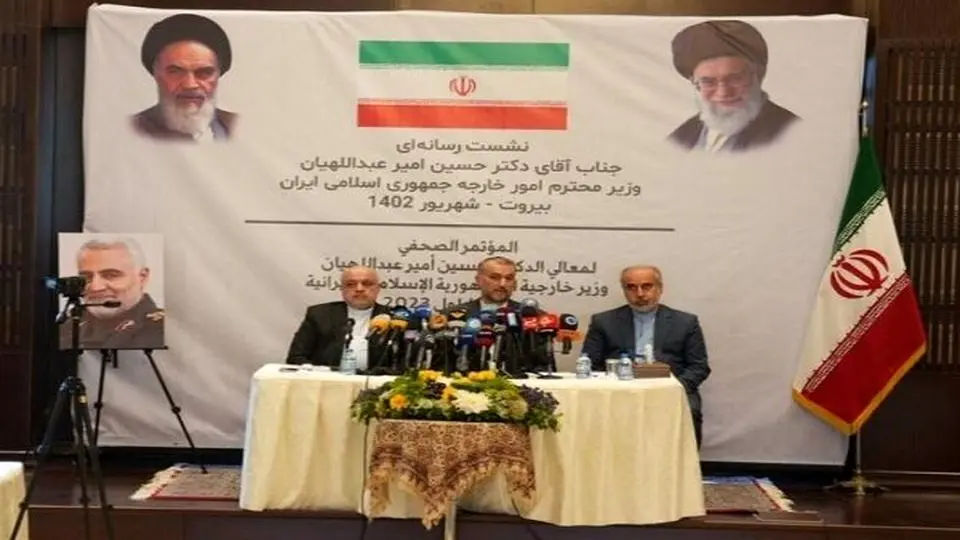
MEHR: Iranian Foreign Minister Hossein Amir-Abdollahian says that the recent agreement between Tehran and Washington will have a positive impact on the indirect sanctions-removal talks.
Addressing a press conference in Beirut on Friday, Amir-Abdollahian said Iran has always supported diplomacy and negotiations to restore the 2015 nuclear deal, officially known as the Joint Comprehensive Plan of Action (JCPOA).
A recent agreement between Iran and the United States on unfreezing Iran's assets illegally frozen in foreign banks and the exchange of prisoners will have a "positive impact on indirect talks about the removal of sanctions."
The top Iranian diplomat reiterated Tehran's political will to revive the JCPOA if all parties fulfill their obligations as per the deal.
The exchange of messages between Iran and the parties in the nuclear agreement are currently underway based on an initiative made by Oman, he noted.
The JCPOA enabled limited sanction relief for Iran, which, in turn, volunteered to change some aspects of its nuclear work.
The US, however, left the agreement in 2018 as part of former President Donald Trump's so-called "maximum pressure" policy against Iran, returning all the sanctions that the deal had lifted.
The US's allies in the deal -- France, Britain, and Germany -- then bowed under Washington's pressure by toeing the sanction line and suspending their trade activities with Tehran.
Negotiations to revive the agreement started in April 2021. The talks have, however, stalled amid Washington's refusal to offer guarantees that it would not ditch the deal again.
Iran ready to end electricity crisis in Lebanon
Amir-Abdollahian, elsewhere in his remarks, said that Iran has on many occasions offered its proposals to solve the crisis in Lebanon and is now ready to send technical and engineering teams to Beirut in order to build power plants to generate 2,000MW electricity.
He said major Iranian companies have built power plants in the neighboring states and other countries across the world, saying, "This contract is to the benefit of both sides."
Iran welcomes any initiative aimed at settling the problem of electricity and energy shortage in Lebanon at the earliest, he said.
Lebanon has been mired in an economic crisis that the World Bank has dubbed one of the worst in recent history, which comes amid crippling sanctions imposed by the US and its allies. The Lebanese pound has lost more than 95 percent of its value on the black market since 2019.
The Arab country has also been beset by a severe fuel crisis that has left many households and businesses struggling with recurrent power outages, while its economic meltdown since 2019 has slowed down imports of fuel for government plants.
Last year, Iran supplied much-needed fuel shipments to Lebanon via Syria after the Lebanese Hezbollah Resistance movement asked for Iranian help to ease the energy shortage in the Arab country.
Regional borders should be borders of friendship
Amir-Abdollahian said during visits to Syria and Lebanon, he held talks with senior officials of the two countries about significant mutual, regional, and international developments.
He said only Baghdad and Damascus must make decisions about border transportation. "The borders of our region should be the borders of economic and commercial friendship. There is no need for restoration of the military and security measures along with Iraq-Syria common borders."
Any normalization of ties with Israeli regime 'strategic' mistake
The top diplomat said Iran believes any normalization of relations with the fake regime of Israel would be a "strategic" mistake.
"We always advise our friends in the region to prevent any normalization of relations with a regime that brought nothing to the region but insecurity," Amir-Abdollahian stated.
The US-brokered normalization deals in 2020, which saw the United Arab Emirates, Bahrain, Sudan, and Morocco normalize ties with the Israeli regime, have sparked widespread condemnations from the Palestinians as well as nations and human rights advocates across the globe, especially within the Muslim world.
Iran, Lebanon enjoy deep-rooted strategic ties
Elsewhere in the presser, Amir-Abdollahian pointed to deep-rooted strategic ties between Iran and Lebanon and said Tehran closely monitors the developments in Beirut.
Iran would continue to support the Resistance movement in a bid to ensure the security of Lebanon and the entire region and counter the Israeli regime, he said.
The minister denounced any foreign intervention in Lebanon's political affairs.
Emphasizing that Iran has never interfered in the domestic affairs of Lebanon, the minister said Tehran will "continue to strongly support the government, nation, army, and Resistance in Lebanon" upon its request.
He reiterated Tehran's support for any agreement among the Lebanese political leaders on the election of the president and the formation of a new government. Amir-Abdollahian said he held a "very promising" meeting with the Secretary-General of Lebanon's Hezbollah resistance movement Seyyed Hassan Nasrallah.
The Hezbollah chief emphasized that in case of any mistake by the Israeli regime, the situation against the Zionists will change in less than a few hours, the Iranian minister said.
Amir-Abdollahian said the Israeli regime is "suffering from multifaceted and security crises inside the occupied territories."
آخرین اخبار Iran را از طریق این لینک پیگیری کنید.

